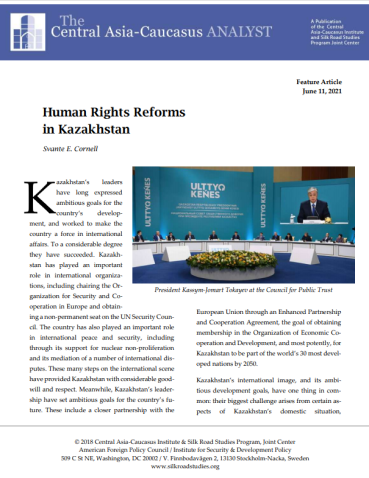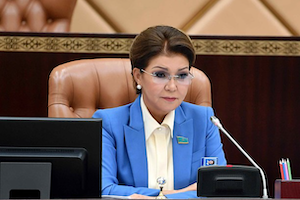Tokayev’s Reforms: An Evolutionary Model of Change?
Tokayev’s Reforms: An Evolutionary Model of Change?
By: Svante E. Cornell and Albert Barro
Much ink has been spilled in recent decades on the failures of democratization in the Middle East and Central Asia. Indeed, for over a decade and a half, Freedom House and other democracy watchdogs have been documenting a clear regression of dem-ocratic development. This has happened not only in countries considered in “transition”, but also in established democracies, where authoritarian tendencies have, unexpectedly, returned.
The Middle East and Central Asia have proven particularly resistant to democratic development. The resilience of authoritarian systems of govern-ment in these regions caused considerable frustra-tion, which switched to great excitement when popular revolutions against corrupt and dysfunc-tional government took place between 2003 and 2011. The wave of revolutions began in Georgia, followed by Ukraine and Kyrgyzstan, upheavals quickly dubbed “color revolutions.” These were followed several years later by the 2011 “Arab spring”, which similarly generated great hope that democracy had finally come to the Middle East.
Except it did not work out that way. The color revolutions and Arab upheavals must now be termed a failure, as no country that experienced these upheavals has progressed in a sustainable way toward democracy. Some, like Libya, Syria and Yemen have descended into civil war. Others, like Ukraine and Kyrgyzstan, experienced recur-rent political crises while continuing to be mired in corruption. For some time, Georgia and Tunisia appeared to go against the grain, and make sus-tained progress – but in recent years, those two have also backtracked. All in all, it seems clear that revolution is not a sustainable model to change entrenched authoritarian habits.
Human Rights Reform in Kazakhstan
Human Rights Reform in Kazakhstan
By: Svante E. Cornell
Kazakhstan’s leaders have long expressed ambitious goals for the country’s development, and worked to make the country a force in international affairs. To a considerable degree they have succeeded. Kazakhstan has played an important role in international organizations, including chairing the Organization for Security and Cooperation in Europe and obtaining a non-permanent seat on the UN Security Council. The country has also played an important role in international peace and security, including through its support for nuclear non-proliferation and its mediation of a number of international disputes. These many steps on the international scene have provided Kazakhstan with considerable goodwill and respect. Meanwhile, Kazakhstan’s leadership have set ambitious goals for the country’s future. These include a closer partnership with the European Union through an Enhanced Partnership and Cooperation Agreement, the goal of obtaining membership in the Organization of Economic Cooperation and Development, and most potently, for Kazakhstan to be part of the world’s 30 most developed nations by 2050.
goals for the country’s development, and worked to make the country a force in international affairs. To a considerable degree they have succeeded. Kazakhstan has played an important role in international organizations, including chairing the Organization for Security and Cooperation in Europe and obtaining a non-permanent seat on the UN Security Council. The country has also played an important role in international peace and security, including through its support for nuclear non-proliferation and its mediation of a number of international disputes. These many steps on the international scene have provided Kazakhstan with considerable goodwill and respect. Meanwhile, Kazakhstan’s leadership have set ambitious goals for the country’s future. These include a closer partnership with the European Union through an Enhanced Partnership and Cooperation Agreement, the goal of obtaining membership in the Organization of Economic Cooperation and Development, and most potently, for Kazakhstan to be part of the world’s 30 most developed nations by 2050.
Kazakhstan’s international image, and its ambitious development goals, have one thing in common: their biggest challenge arises from certain aspects of Kazakhstan’s domestic situation, particularly those relating to individual rights and freedoms. As became clear during Kazakhstan’s candidacy for the OSCE chairmanship, international concerns regarding individual rights and freedoms in the country constituted a significant challenge that led to reservations from influential member countries and, fairly or not, delayed Kazakhstan’s chairmanship. More broadly, while Kazakhstan’s contributions to international peace and security are widely recognized, criticism concerning human rights issues in the country continue to emerge both from partner governments, international organizations, and non-governmental bodies.
Dariga Nazarbayeva's Political Ambitions Effectively Ended by President Tokayev
By John C. K. Daly
June 18, 2020, the CACI Analyst
Few processes are more opaque than political succession in the post-Soviet space, which is usually dominated by elite cronyism infighting. The practice becomes particularly pronounced when the departing leadership dates from the Soviet era and attempts to put its stamp on the transition to the future. In general, the leadership seeks to ensure a peaceful transition of power, even if circumventing the wishes of the departing leader. The latest post-Soviet nation to transit the process is Kazakhstan, where on May 2, Kazakh President Kasym-Zhomart Tokayev, having succeeded Nazarbayev as president 14 months earlier, unexpectedly posted a single-sentence announcement that he had removed Dariga Nursultanovna Nazarbayeva from her position as Senate speaker.




